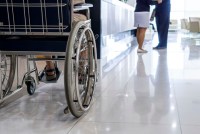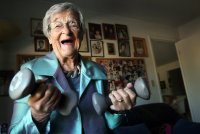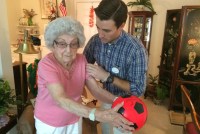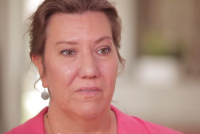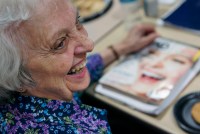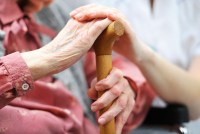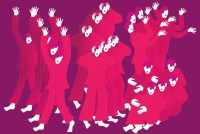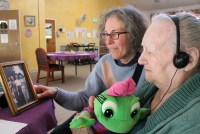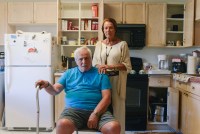Latest KFF Health News Stories
Nursing Homes’ Residents Face Health Risks From Antibiotics’ Misuse
The Centers for Disease Control and Prevention urges homes to improve their policies in fight against antibiotic-resistant superbugs.
Dementia Also Takes Toll On Unpaid Caregivers, Study Shows
The research shows 77 percent of those with dementia receive routine help with household tasks or personal care such as bathing and dressing. Only 20 percent of the 33 million people without dementia received similar help.
Hospital Care Unaffected By Quality Payments, GAO Finds
The Government Accountability Office found bonuses and penalties have been small, and hospital performance has been steady.
Seniors Tell Medical Students What They Need From Doctors
Many students avoid geriatrics because of the low pay and high complications, but six people over 90 offer a different perspective to help attract young doctors.
Surge In Statin Use Among Very Elderly Without Heart Trouble Raises Doubts
Preventive medicine trend highlights shortage of studies on drugs’ effects on very elderly.
How One Home Health Agency Earned Five Stars
In North Carolina, Brookdale Home Health Charlotte was one of just two agencies out of the state’s 172 to earn the maximum five stars from the federal government.
In L.A., Longevity And Health In Later Life Vary By Community
A report on aging in L.A. County finds pronounced differences in life expectancy and in the health of older residents, depending on ethnicity and neighborhood.
This model of care is one of the ways created by the Affordable Care Act to reduce health care costs while improving quality of care. You can also watch the accompanying video that explains ACOs.
When Prisons Need To Be More Like Nursing Homes
By 2030, nearly one-third of all inmates will be over 55, the ACLU says, and caring for aged prisoners often costs twice as much as caring for younger ones. Some states – New York, California and Connecticut — are confronting the problem, however, with innovative programs meant to improve care and save money.
A Racial Gap In Attitudes Toward Hospice Care
Hospice use has been growing fast in the United States as more people choose to avoid futile, often painful medical treatments in favor of palliative care and dying at home surrounded by loved ones. But some African-Americans have long resisted the concept, and their suspicions remain deep-seated.
Telephone Therapy Helps Older People In Underserved Rural Areas, Study Finds
Counseling by mental health professionals over the phone was effective in reducing anxiety and depressive symptoms, according to researchers.
5 Challenges Facing Medicaid At 50
The federal-state health care program covers nearly half of all births, one-third of children across the country and two-thirds of people in nursing homes.
California Judge Dismisses Aid-In-Dying Lawsuit
A California woman sued to allow her doctor to prescribe life-ending medication without fear of prosecution; a decision is expected Monday.
Advocate For Alzheimer’s Research Says Aging Baby Boomers Face Big Threat From Disease
Dr. Maria Carrillo tells KHN that in addition to finding ways to screen for the disease and treat it, public health officials need to think about increasing the number of skilled nursing homes and home health aides.
New Regulations Would Require Modernizing Nursing Home Care
The proposed rules, released in advance of the White House Conference on Aging, cover wide-ranging topics, from meals to roommate selection to staff training.
Want A Good Laugh? Head To The Hospital
Across the country, hospitals are offering seniors social activities and other benefits to help them stay healthy and out of the hospital, while also encouraging them to come back to visit.
Advocates say the law has permitted homes to give anti-psychotic drugs, use restraints and withdraw treatment without allowing patients to object. But the industry warns the ruling will make it more challenging to provide routine care to such patients.
For Many Patients, Delirium Is A Surprising Side Effect Of Being In The Hospital
The problem, which is often preventable, is estimated to cost more than $143 billion annually and disproportionately affects people older than 65. It is often misdiagnosed as dementia.
Calming Dementia Patients Without Powerful Drugs
In California nursing homes, just over 15 percent of dementia patients are on antipsychotic drugs. That’s far more than advocates say is necessary. But that number is down from almost 22 percent just three years ago.
In Sunlit Paradise, Seniors Go Hungry
Even in what look like middle class enclaves in Florida, a growing number of seniors are having trouble keeping food on the table. The rate of food insecurity across the country more than doubled among seniors between the years 2001 to 2013.



